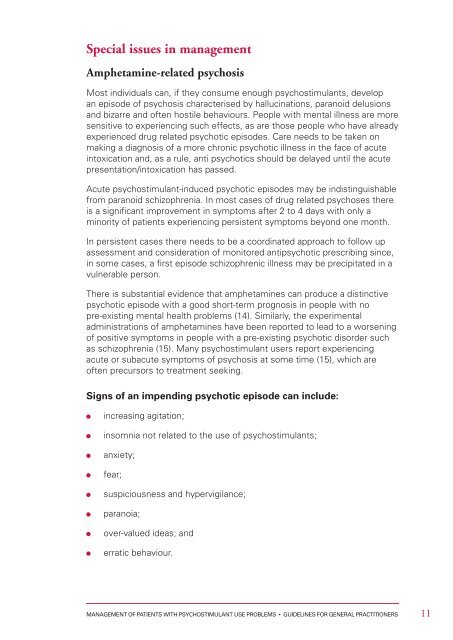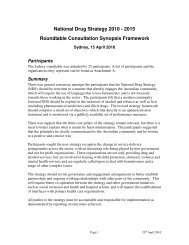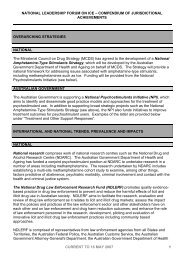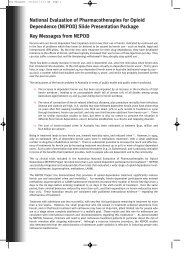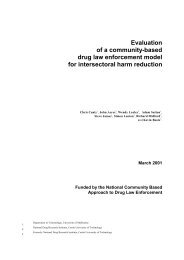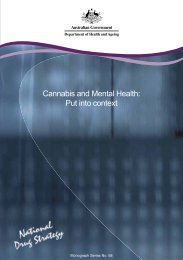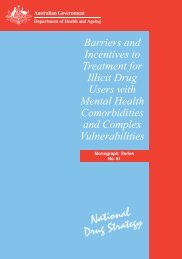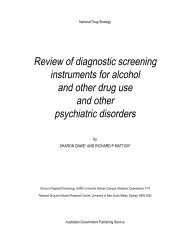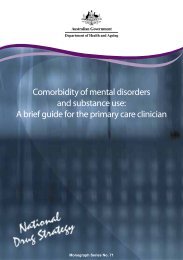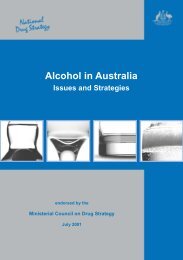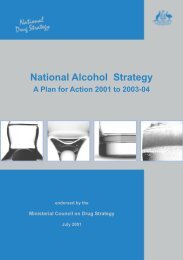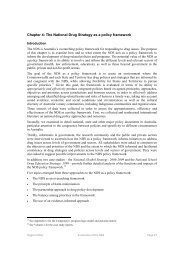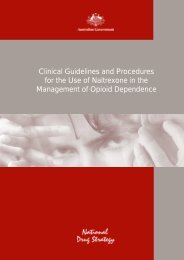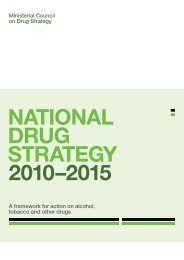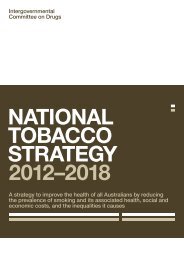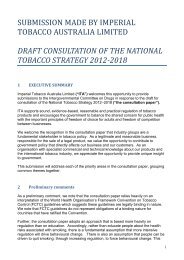Management of patients with psychostimulant use problems
Management of patients with psychostimulant use problems
Management of patients with psychostimulant use problems
Create successful ePaper yourself
Turn your PDF publications into a flip-book with our unique Google optimized e-Paper software.
Special issues in management<br />
Amphetamine-related psychosis<br />
Most individuals can, if they consume enough <strong>psychostimulant</strong>s, develop<br />
an episode <strong>of</strong> psychosis characterised by hallucinations, paranoid delusions<br />
and bizarre and <strong>of</strong>ten hostile behaviours. People <strong>with</strong> mental illness are more<br />
sensitive to experiencing such effects, as are those people who have already<br />
experienced drug related psychotic episodes. Care needs to be taken on<br />
making a diagnosis <strong>of</strong> a more chronic psychotic illness in the face <strong>of</strong> acute<br />
intoxication and, as a rule, anti psychotics should be delayed until the acute<br />
presentation/intoxication has passed.<br />
Acute <strong>psychostimulant</strong>-induced psychotic episodes may be indistinguishable<br />
from paranoid schizophrenia. In most cases <strong>of</strong> drug related psychoses there<br />
is a significant improvement in symptoms after 2 to 4 days <strong>with</strong> only a<br />
minority <strong>of</strong> <strong>patients</strong> experiencing persistent symptoms beyond one month.<br />
In persistent cases there needs to be a coordinated approach to follow up<br />
assessment and consideration <strong>of</strong> monitored antipsychotic prescribing since,<br />
in some cases, a first episode schizophrenic illness may be precipitated in a<br />
vulnerable person.<br />
There is substantial evidence that amphetamines can produce a distinctive<br />
psychotic episode <strong>with</strong> a good short-term prognosis in people <strong>with</strong> no<br />
pre-existing mental health <strong>problems</strong> (14). Similarly, the experimental<br />
administrations <strong>of</strong> amphetamines have been reported to lead to a worsening<br />
<strong>of</strong> positive symptoms in people <strong>with</strong> a pre-existing psychotic disorder such<br />
as schizophrenia (15). Many <strong>psychostimulant</strong> <strong>use</strong>rs report experiencing<br />
acute or subacute symptoms <strong>of</strong> psychosis at some time (15), which are<br />
<strong>of</strong>ten precursors to treatment seeking.<br />
Signs <strong>of</strong> an impending psychotic episode can include:<br />
increasing agitation;<br />
insomnia not related to the <strong>use</strong> <strong>of</strong> <strong>psychostimulant</strong>s;<br />
anxiety;<br />
fear;<br />
suspiciousness and hypervigilance;<br />
paranoia;<br />
over-valued ideas; and<br />
erratic behaviour.<br />
MANAGEMENT OF PATIENTS WITH PSYCHOSTIMULANT USE PROBLEMS • GUIDELINES FOR GENERAL PRACTITIONERS<br />
11


